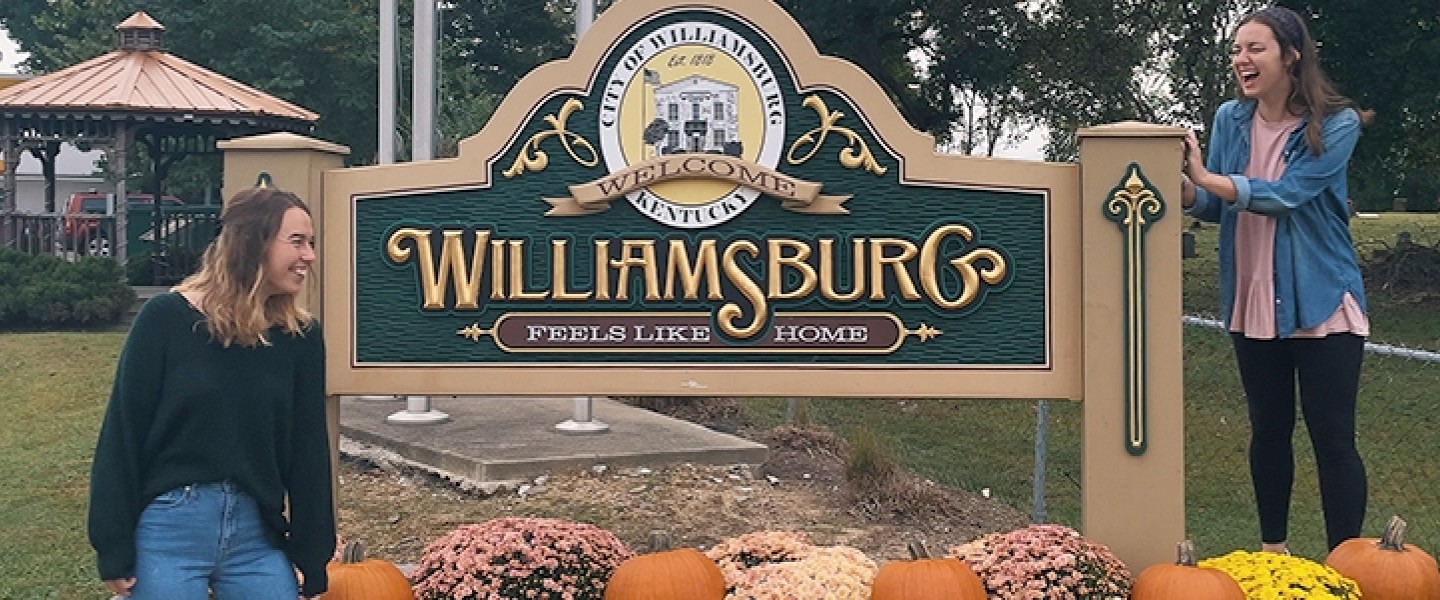“You’re from Colorado? And you didn’t know anyone at the university before you moved here? How did that transition work?”
These are my three most frequently asked questions, whether by peers, incoming freshmen on a campus tour, or a relative at a family reunion. It does not matter the audience, all are shocked when I respond, “Mm-hm, that’s right! Would you believe me if I told you that I get homesick for Cumberlands now?” It wasn’t always easy, but I’ve found ways to make Cumberlands my second home. I am confident that anyone can make this transition, regardless if you grew up 10 miles away or 10,000 miles away. That being said, here are a few guidelines of choices to make (and mistakes to avoid) that can make the college transition easier.
Do – Eagerly learn about your new environment
What makes Williamsburg a special place? What are some local spots that everyone enjoys? Is there any slang unique to the area? Ask someone who knows the area – whether that be a local, a faculty member, or an upperclassman. Learning everything Williamsburg has to offer made me more appreciative and connected to the town.
Don’t – Get bogged down by excessively comparing Williamsburg to your hometown
Don’t expect everything to be the same as back home. It is a different town, so it should feel different. In the same way that there are unique aspects of your hometown that make it wonderful, there are unique aspects about Williamsburg that are wonderful – and those aspects might look completely different. Be appreciative of the small things like the fog over the mountains, Sunday brunch at a local café, and drives on backroads surrounded by trees.
Do – Eat and study outside of your dorm room
Being out and visible can increase your chances of randomly meeting a new friend, future employer, or maybe even soulmate. Some of my favorite study spots include the BCC balcony, the downtown location of Cumberland River Coffee, and the top level of the library (especially by the big windows – trust me). Although it might seem intimidating, being outside of your dorm will help you feel more familiar with the campus, people, and environment.
Don’t – Hide out in your dorm room
Days will come where a social break might be necessary. But outside of that, try to be out and about. This will help you make more friends, maximize your campus experience, and mentally distinguish where you study and eat from where you sleep. Also, realistically, is studying on or near a bed after a long day going to go over well? Take it from the girl who has fallen asleep while typing many times – it does not.
Do – Make friends on campus
Invite the people across the hall from you to eat dinner, talk to your classmates, ask the student workers in the cafeteria how their day is going, sign up to be a part of CAB (Campus Activities Board) – the opportunities to meet people are endless! Have courage and put yourself out there.
Don’t – stay so connected to people at home that you forget to make connections on campus
Yes, staying up to date with everyone at home is important and worthwhile, but relying so heavily on people back home that you do not find a support system at school is a mistake. Remember, there was once a time when your current best friend was a stranger. Getting to know others can be a process, but relationships are a worthwhile investment.
Do – Say yes to new adventures
Saying yes to spontaneous trips is a great way to push yourself out of your comfort zone and become more familiar with the area. On days when homework is minimal (or completed), try to explore as much as possible. Some of my favorite adventures include treasure hunting in the Williamsburg Vendors Mall, swimming under the stars at the Spillway, and going on mini road trips to new coffee shops (check out K Brew in Knoxville – they have hammocks).
Don’t – Say no just because of unfamiliarity
Trying new things is a huge part of the college experience! For example, local events like the Chicken Festival in Corbin, Old-Fashioned Trading Days in the ’Burg, and trips to the seasonal local restaurant The Root Beer Stand might sound odd, but they could make for fantastic memories. Engaging in small local activities has created amazing memories that I would have missed out on if I had stayed in my comfort zone – so try not to write something off just because it’s outside your norm.
Do – Get involved with the community
Finding a job off campus and getting involved with a local church are two activities that have helped me feel connected to Williamsburg. Interacting with students/faculty on campus made me feel tied to the university, but working at a restaurant and being a member of a church in Williamsburg has made me connected to the town itself.
Don’t – Forget the community of Williamsburg
Being involved on campus is important, but connection to Williamsburg as a whole will make the area feel more like home. Think of all the ways you rooted yourself in your community at home and try to replicate those actions here. Maybe it’s a part-time job, maybe it’s shopping locally, or maybe it’s something as simple as taking walks and appreciating your surroundings. Regardless, find a way to connect yourself to the town of Williamsburg and watch the way it slowly finds a place in your heart.
In the end, you know yourself best, so feel free to take this general guide and cater it to your unique personality! Maybe studying outside of your dorm room every day sounds like a stretch, but talking to the people across the hall and making friends in class sounds doable. Regardless of how you like to make yourself at home here, I hope this guide is helpful and gives you some ideas on how to make your transition to college a success.

